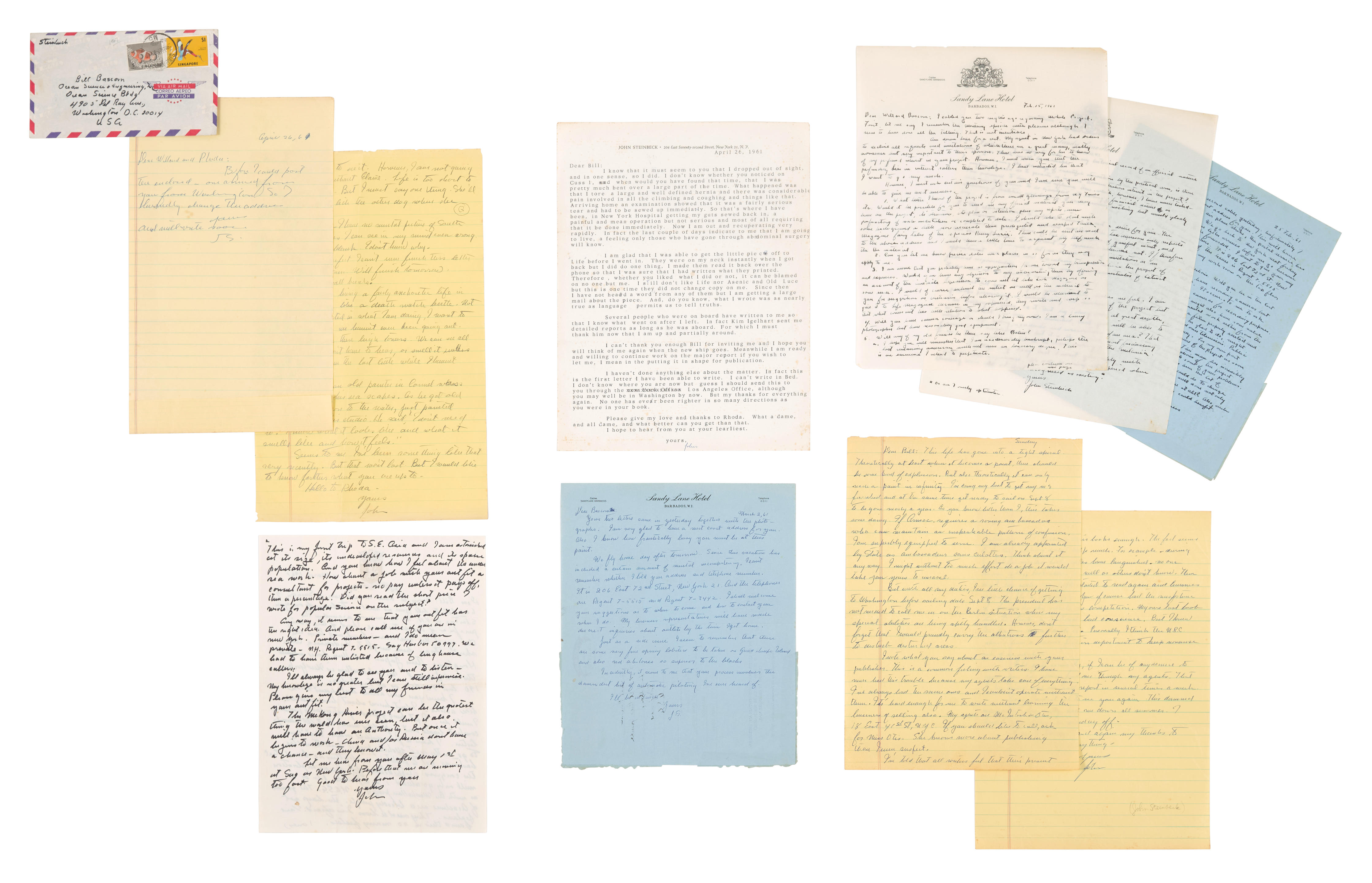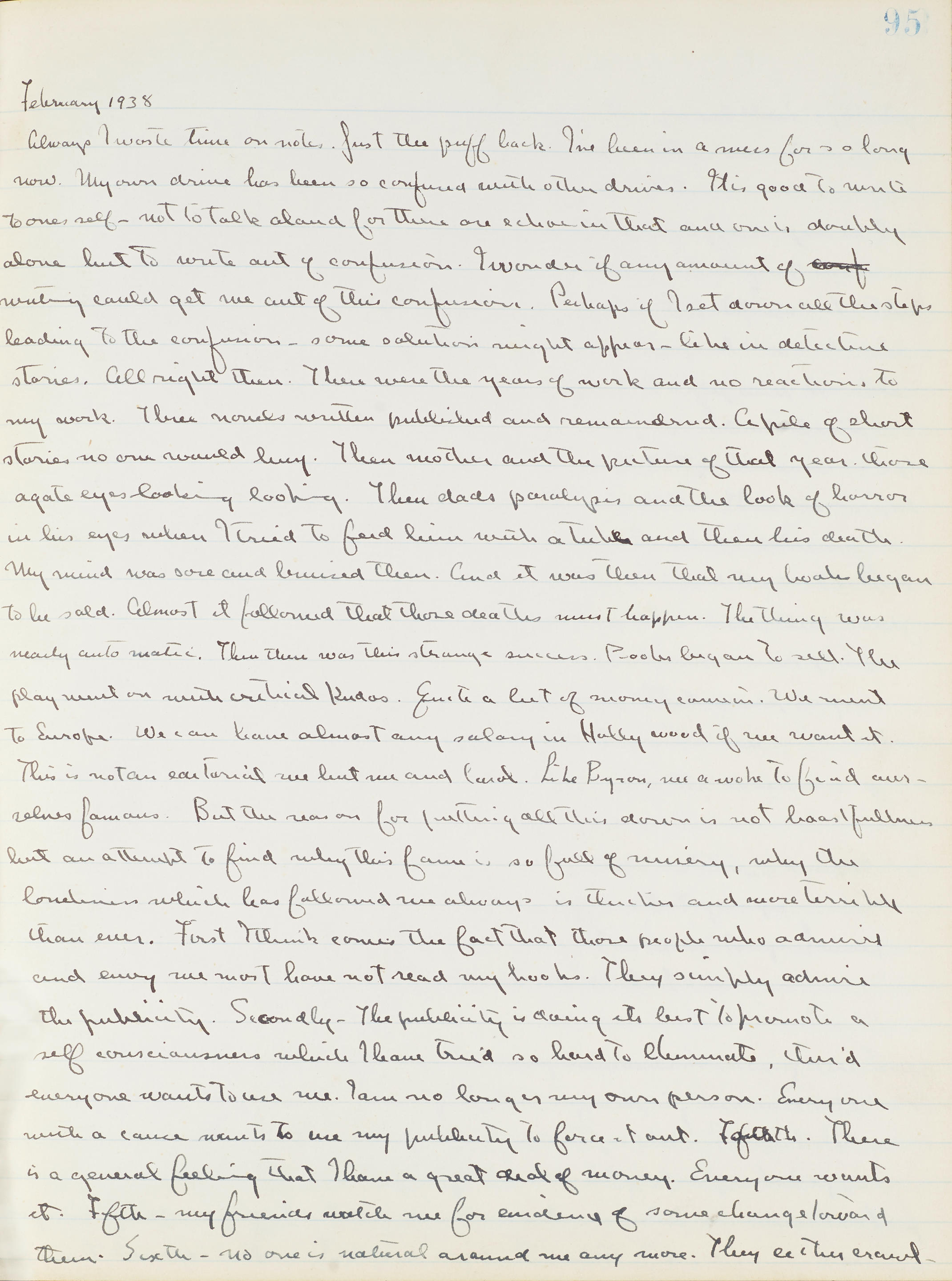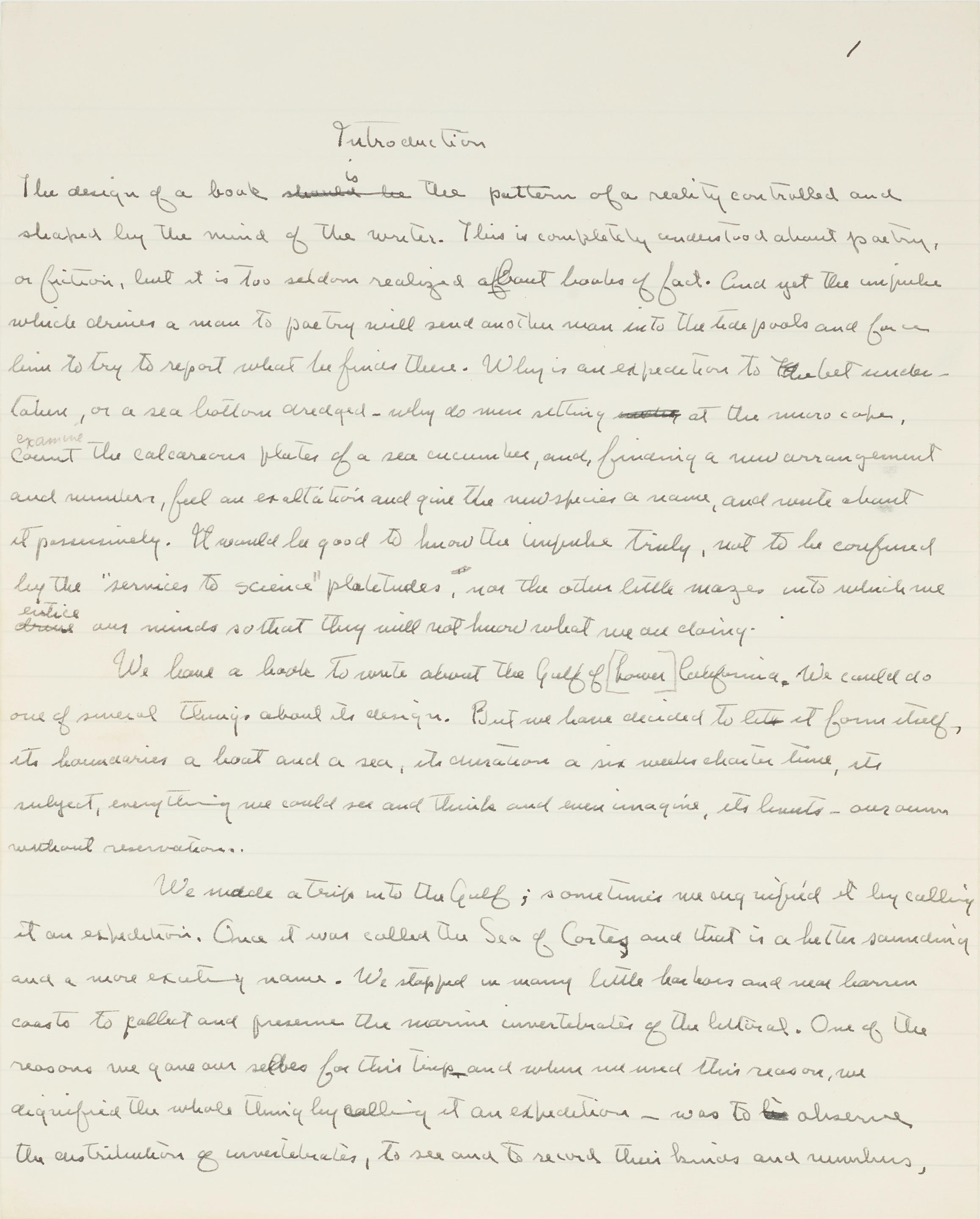An autograph manuscript, an incomplete early draft of an article "My Short Novels" [N.p. but ?New York: 1953]. 6 pp. (verso only of 6 ll.), folio (315 x 200 mm.) in pencil on lined paper. Condition: paper brittle, small tears with occasional slight loss.
early draft of steinbeck’s own review and background of some of his most important works. Viking Press had published a volume called The Short Novels of John Steinbeck earlier in the year. In it were collected six titles: The Red Pony , Tortilla Flat , Of Mice and Men , The Moon Is Down , Cannery Row and The Pearl . The final essay, perhaps originally intended as the introduction, was published separately as a sort of addendum to the book. Steinbeck starts with general thoughts about writing "You see a book even a little book is a kind of person … During the time of a books writing, the Author is his book - not one or another of the characters but the whole book, the whole person". He goes on to admit that the article marks a new departure for him: "I have never gone back over books long finished until now". The genesis of the article was a question from his editor the six novellas "What were the circumstances of their writing. Set down some anecdotes, why did you write them." He goes on to give details about the six titles: The Red Pony "was set down in a welter of pain. My Mother was dying and her death was the first break in the family"; Tortilla Flat was influenced by the fact that Steinbeck "had been reading extensively concerning the Arthurian cycle … And then as an exercise I wrote Tortilla Flat using the people and the stories currently told in Monterey but trying to set them in a moral tissue like the Gesta Romanorum. It was a kind of satiric attempt to write folk lore". Of Mice and Men "was another experiment. I thought it might be possible to write a play in novel form." Steinbeck notes that he had finished about two thirds of the novel when he went out for the evening and returned to find that his dog Toby (a setter prone to brooding) had torn the manuscript "to confetti" ("Perhaps his critical sense took charge"). Nothing was salvageable and Steinbeck had to start again from scratch. The Moon Is Down , written during the Second World War, "was a kind of declaration of faith in the strength and survival of free and democratic men over dictatorship. The book got me into lots of trouble … And I had thought of it only as a parable. I set it in a mythical country. And I still believe what it says". Steinbeck gives two slightly differing versions of his reasons for writing Cannery Row "…written on my return from Europe and Africa where I served as a War Correspondent. It was written as a nostalgic thing to forget the bitterness and horror…", which alters slightly to: it was written "for a group of soldiers who has said "Write something funny that isn't about the war."" In any case and despite the critics, many copies were sold. "In Mexico I heard a story and made a long jump back to the Tortilla Flat time. I tried to write as folk lore - to give it that set aside and raised up feeling that all folk stories have. I called it "The Pearl. It didn't do so well at first either but it seems to be gathering some friends or at least acquaintances
An autograph manuscript, an incomplete early draft of an article "My Short Novels" [N.p. but ?New York: 1953]. 6 pp. (verso only of 6 ll.), folio (315 x 200 mm.) in pencil on lined paper. Condition: paper brittle, small tears with occasional slight loss.
early draft of steinbeck’s own review and background of some of his most important works. Viking Press had published a volume called The Short Novels of John Steinbeck earlier in the year. In it were collected six titles: The Red Pony , Tortilla Flat , Of Mice and Men , The Moon Is Down , Cannery Row and The Pearl . The final essay, perhaps originally intended as the introduction, was published separately as a sort of addendum to the book. Steinbeck starts with general thoughts about writing "You see a book even a little book is a kind of person … During the time of a books writing, the Author is his book - not one or another of the characters but the whole book, the whole person". He goes on to admit that the article marks a new departure for him: "I have never gone back over books long finished until now". The genesis of the article was a question from his editor the six novellas "What were the circumstances of their writing. Set down some anecdotes, why did you write them." He goes on to give details about the six titles: The Red Pony "was set down in a welter of pain. My Mother was dying and her death was the first break in the family"; Tortilla Flat was influenced by the fact that Steinbeck "had been reading extensively concerning the Arthurian cycle … And then as an exercise I wrote Tortilla Flat using the people and the stories currently told in Monterey but trying to set them in a moral tissue like the Gesta Romanorum. It was a kind of satiric attempt to write folk lore". Of Mice and Men "was another experiment. I thought it might be possible to write a play in novel form." Steinbeck notes that he had finished about two thirds of the novel when he went out for the evening and returned to find that his dog Toby (a setter prone to brooding) had torn the manuscript "to confetti" ("Perhaps his critical sense took charge"). Nothing was salvageable and Steinbeck had to start again from scratch. The Moon Is Down , written during the Second World War, "was a kind of declaration of faith in the strength and survival of free and democratic men over dictatorship. The book got me into lots of trouble … And I had thought of it only as a parable. I set it in a mythical country. And I still believe what it says". Steinbeck gives two slightly differing versions of his reasons for writing Cannery Row "…written on my return from Europe and Africa where I served as a War Correspondent. It was written as a nostalgic thing to forget the bitterness and horror…", which alters slightly to: it was written "for a group of soldiers who has said "Write something funny that isn't about the war."" In any case and despite the critics, many copies were sold. "In Mexico I heard a story and made a long jump back to the Tortilla Flat time. I tried to write as folk lore - to give it that set aside and raised up feeling that all folk stories have. I called it "The Pearl. It didn't do so well at first either but it seems to be gathering some friends or at least acquaintances














Testen Sie LotSearch und seine Premium-Features 7 Tage - ohne Kosten!
Lassen Sie sich automatisch über neue Objekte in kommenden Auktionen benachrichtigen.
Suchauftrag anlegen